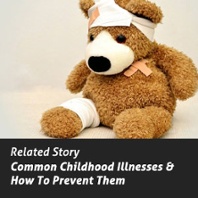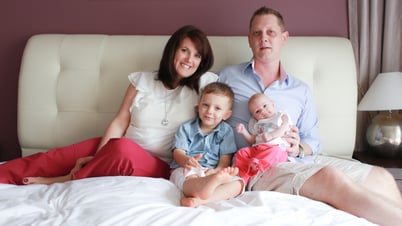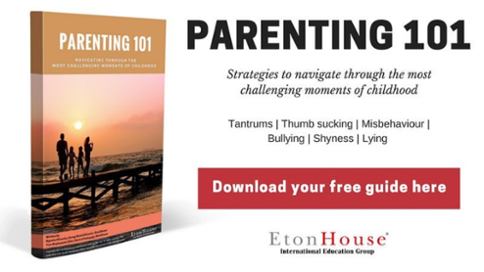-1.png)
EtonHouse Singapore
As a parent of a newborn or soon-to-be parent, you must have concerns about their sleep routines and the number of sleepless nights that will be coming your way. All parents want their infants to sleep well and adapt to an ideal sleep routine. How much should your baby sleep? How does their sleep schedule change over time? How can we implement healthy sleep in the middle of these less-structured schedules?
We speak to Louise Duncan from Petite Dreamers, where they specialise in sleep routines for babies. Louise is a certified sleep consultant and a mother of two. She has helped many parents who have struggled with their child’s sleeping and has come up with step-by-step customised plans to help them through these challenges.
You can listen to the podcast here.
What do I need to know about my newborn’s need for sleep?
When your baby is born, it is a brand new experience. For nine months they have been growing in the 'baby's cave', inside its mother's tummy with no light and muffled sounds through all the amniotic fluid, etc.
It is important to understand that:
- A newborn's sleep can be quite erratic as your baby's getting used to being earth side rather than tummy side.
-
You need to shake off the expectation around their sleep routine. Oftentimes, before the child is born, we do lots of research and there's so much conflicting information out there that can make it really hard to know if what you are reading is right.
- For babies younger than three months, any amount of sleep is a good amount of sleep. As long as your baby gets some sleep, it really is better than no sleep.
What does a good sleep routine entail?

Having a good sleep routine is really important, not just for newborns, but for all of us, When we're learning how to sleep, the best approach is putting in a bedtime or a nap time routine in place. It is effectively like your baby being aware of the time and they are prepared for what’s coming next when the sequence is kept the same every single night. It helps them fall asleep better.
There are 5 key elements to a baby's sleep routine:
- Ensure that their bedtime includes a milk feed. This is their last milk feed of the daytime hours and there is a difference in the way you feed your baby during the day and during the night.
- Always include a bath or at least a wipe down, it is one of the best ways to cornerstone what bedtime looks like as it's a gateway into sleep. It also helps a baby regulate their body temperature in getting ready to go to sleep.
- Put them in nice clean clothes, something nice and fresh to go to bed with. Also include a little baby massage, swaddle them up, or put them in a baby sleep sack.
- Read them a little story or sing them a song whilst having a cuddle, have some one on one time with them in a quiet environment.
- Finally, getting them to fall asleep- it might be whether you like to rock your baby, pat your baby, or what is effective for them.
What are the struggles we should be aware of?

- Naps are difficult, but they are very important. One of the things that makes it so difficult in Singapore is because it's hot, noisy and bright and these three things contribute to our body clocks being very strong. During the day as humans, we are not engineered to sleep. Hence when you add all those external elements and environmental factors it makes it even harder for babies to fall asleep during the day. As a parent, be kind to yourself and do not get too stressed over the duration of how much your baby has slept. As mentioned earlier, any amount of sleep is good sleep.
- Another thing that makes sleep really hard is that over-tiredness is the nemesis of good sleep. Many parents mistake hyper energy as a sign that their babies don't need sleep, when in actual fact that by the time they get to that stage, they actually are really over tired and that's when they really need sleep.
- Keep your eye on their time. For a newborn baby, realistically 45 minutes. If you're a breastfeeding mom it takes 40 minutes to feed. You will feed them, change their nappy, burp them, and then get them down for their next nap.
How do sleep patterns change with time?
Sleep patterns do change. Every parent out there is very familiar with the term ‘The 4-month sleep regression’. Although it is a change in your child's sleep, it isn’t actually a regression, a regression would indicate that it's going to change and then change back. When in actual fact what happens at that time around the full month mark, your baby's sleep changes for effectively being what I affectionately call baby sleep, which is the sleep patterns in which they're born with, into what is a fully formed sleep cycle. Within that sleep cycle, there are a lot of lighter phases of sleep. Children who may have historically for the first couple of months been good sleepers, all of a sudden have erratic sleep where it regresses and changes. They become more susceptible to waking up and they feed more frequently. So, sleep does change in that regard but once they've gone through that stage of reorganisation of sleep, your baby’s sleep has the same makeup of sleep that you do as an adult.
How do we create a good sleep environment?
- Having a safe and independent space for your baby to sleep- like a bassinet or a cot.
- Get blackout curtains as some babies are really susceptible to light and that's even more important during the daytime.
- A white noise machine or a white noise app is really useful. Play it for the duration of your baby's sleep.
- Swaddle or to use a sleep sack for babies up to three months. When they get older,, put them in a sleep sack, which is effectively a wearable blanket.
- Get a baby monitor because you want to be able to make sure you can keep an eye on them and keep them safe.
- Ensure your baby is sleeping safely. A safe sleep environment is one in with a firm clean surface to sleep, like a mattress with a fitted sheet. Read up on the AAP, the American Academy of Paediatrics. They have a whole section on safe sleep.
Could you share more about Petite Dreamers and what you do?
I am the founder of Petite Dreamers and I started my company about five and a half years ago, nearly six. It all came about when my own daughter who was eight months at the time didn't sleep well. She would sleep probably about 30 minutes a day and then be up most of the night, she was really sleep deprived. Also, I had pretty bad postnatal depression. I then reached out to another sleep consultant who used to be in Singapore and she helped me teach
 my child how to sleep. From that day on, it all came to be. I would say I am the buffer between everything that you've read on the internet. I ask parents hundreds of questions in order to come up with a plan that I know will suit them. I implement it and support them through that implementation.
my child how to sleep. From that day on, it all came to be. I would say I am the buffer between everything that you've read on the internet. I ask parents hundreds of questions in order to come up with a plan that I know will suit them. I implement it and support them through that implementation.
Everyone just wants to know they're doing the right thing and that they're doing it well. When things are a little bit frightening and you're doing something that you're not quite sure of, that's where I'm there to basically hold your head to get you through it.

.png)
